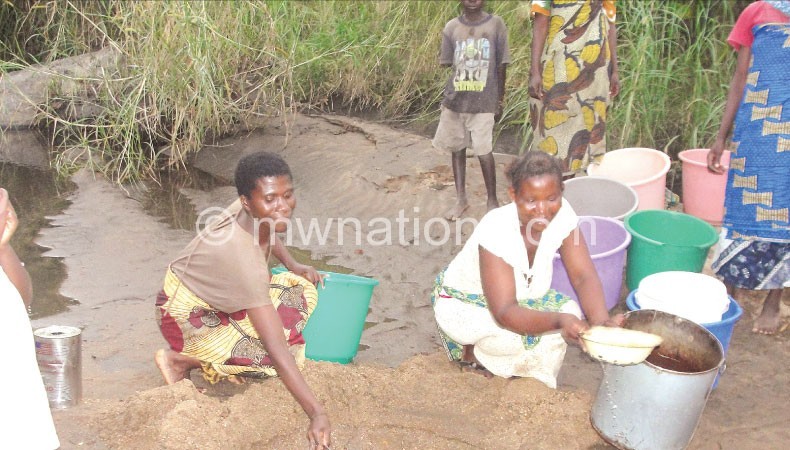Lessening water woes in Karonga

Development is not a matter of charity, but an entitlement. Karonga residents are using this approach to lessen water woes. I visited Karonga.
——————————
For several reasons, Karonga residents often find it hard to find safe water. Most communities along Lake Malawi have no access to clean water. Residents have to walk long distances to access the life-sustaining liquid and some sources contain salts that leave children’s teeth brownish.
In most rural areas, people have to walk up to four kilometres to get to boreholes which serve about 600 people, three times greater than the pumps’ target population.
“Access to water is a big problem,” says Kayuni One resident Mercy Ndovi. “Government gave us boreholes, but they are far apart and hardly adequate.”
In an interview, Lupembe dweller Brenda Nyirenda affirmed: “Time is money. We waste precious hours fetching water instead of doing income generating activities.
“At worst, our school-going children report late for classes as they have to escort us to the boreholes which often dry up while we are waiting for our turn on the endless queue.”
In the remote setting, the water woes flash past vividly. In Mwenelupembe One, two out of 10 boreholes are rusting due to breakdowns. In Lupembe Two, they have no borehole—leaving nearly 60 households begging water from neighbouring villages and drinking from streams together with their livestock.
Until recently when they got a new borehole, nearly 200 people in Mwamtowa Village were in the same predicament as Lupembe Two, a lack which exposes them to waterborne diseases.
Farcically, the people of Cheghama are thirsting despite having plenty of water sources. There are five villages under Cheghama’s headship in Karonga Central.
On paper, there are 13 boreholes meant for 382 households in the rural setting—an appreciable number considering that one pump is meant to serve about 200 people.
On the ground, only six out of the appreciable total are working.
“Seeing people go past boreholes as they endure long distances in search of water, is there anything to smile about? The few pumps that are working often dry,” says village development committee member Gregory Ngozo.
The area is hilly and the water table is so low that there is need to construct dams to enhance provision of water in the area, says Ngozo.
“Most of the boreholes that stopped working are shallow,” he explains.
The plight of mountainous areas is clear in Melele atop Khawa Hills. The cassava-growing area is highly populated, thanks to its fertile soils. Those sinking boreholes have to drill over 100 metres deep to find water, he says.
“The people are crying for safe water because the only borehole available has been on and off since 2000 when it was sank,” says Malele.
According to the 2011 Welfare Monitoring Survey 2011, nearly 95 out of 100 people in Karonga have access to potable drinking water sources. This is above the national average of 83.7 percent—meaning Karonga is one of the districts that is doing better as regards access to potable water supply services, says the Department of Water Development.
But statistics tend to hide the human faces and true life stories behind the glorious figures.
This was the most prevalent perception in 2012 when the Catholic Commission for Peace and Justice (CCJP) in Karonga Diocese commenced a programme promoting democratic and accountable governance.
“This is a community-driven initiative,” says CCJP project officer Louis Nkhata of the programme funded by Trocare Ireland.
He explains: “For years we have been senstising people on their right to development. We hope the knowledge will empower them to demand what they need, for development is a matter of entitlement, not charity.”
Not only are people using the knowledge to spell out their problems, but also to summon relevant service providers to account for pitfalls in service delivery.
Lupembe councillor Ernest Mwalughali is Karonga District Council deputy chairperson. He confesses to being elected to be people’s bridge when it comes to development and thanks CCJP for awakening them to start demanding development.
“I don’t just hear about the problem, but I see it. Wherever I go, even at the council, water issues always feature highly on the agenda. There is need for a constant lobby to make sure we are scratching where it itches,” says Mwalughali.
Nearly five months ago, Water Development officer Aaron Chaponda was summoned to explain why the majority of people were still relying on risky water sources when Lake Malawi, the continents’ third-largest fresh-water body, is within sight.
The government official thanked the locals for standing up to highlight their problems, saying it will enhance their understanding of community problems, priorities, planning and distribution of water projects in the districts.
Mwilang’ombe residents might have asked for an upgrade from boreholes to tap water, but they are happy to have received deeper boreholes.
According to Mwilang’ombe ADC chairperson Hannock Mtete, the district council has accorded them 11 deep boreholes to be drilled with funding from World Vision Malawi (WVM) which strives to create a better world for children and other vulnerable groups.
In an interview, Mtete said: “Water problems are still lingering. Water is predominantly salty and the boreholes shallow. However, we are grateful that new boreholes are being drilled.”
“Knowing how to claim our rights makes change possible and the picture looks better with the coming of councillors. They have really opened doors to the council,” he said.
The Catholic Development Commission in Malawi (Cadecom) has drilled two boreholes and maintained broken down pumps in Mlelasambo, Mwakhwawa, Chilumba Jetty, Zenganjala, Zindiri, Lushombe and other areas.





